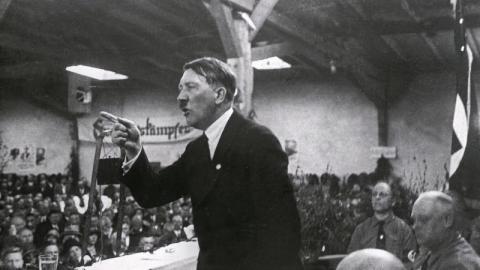Adolf Hitler on Connecting With The Mass and The 'Away-From-Rome' Movement
 Continuing with passages from Mein Kampf, 2017 Thomas Dalton translation. See here.
Continuing with passages from Mein Kampf, 2017 Thomas Dalton translation. See here.
P 227, 3.23 EFFECT ON THE MASS
HE WHO IS INCAPABLE OF PASSIONATE FEELING and speech was never chosen by Providence to proclaim its will.
Therefore a mere writer should stick to his ink-bottle and busy himself with theoretical questions, if he has the requisite ability and knowledge. He has been neither born nor chosen to be a leader.
A movement that has great ends to achieve must carefully guard against the danger of losing contact with the masses of the people.
Every question encountered must be examined primarily from this viewpoint, and the decision to be made must always be accordingly.
The movement must avoid everything that might weaken its power of influencing the masses—not from 'demagogic' motives but because of the simple fact that no great idea, no matter how sublime and exalted it may appear, can be realized in practice without the effective power of the popular masses.
Hard reality alone must mark the way to the goal. Unwillingness to walk the road of hardship means, only too often in this world, the total renunciation of one's aims and purposes—whether consciously willed or not.
As soon as the pan-German leaders accepted the parliamentary principle and moved the center of their activities away from the people, they sacrificed the future for the sake of a cheap momentary success.
They chose the easier way in the struggle, and in doing so rendered themselves unworthy of final victory.
[…]
If there had been a proper appreciation of the tremendous powers of endurance always shown by the masses in revolutionary movements, a different attitude towards the social problem and propaganda would have been taken. The movement's center wouldn't have been transferred to parliament, but would have remained in the workshops and the streets.
Trump would do well to follow this advice--which he instinctually does--to speak directly to the people (Twitter) and to keep holding public rallies. But he needs to talk straight to the people, not just enumerate his supposed accomplishments (brag on himself). He has to remain “revolutionary” and resist the comforts of the establishment.

Adolf Hitler in a 1925 public meeting working up a sweat. He often spoke for several hours and kept the attention of the crowd.
In the first part of this passage, Hitler is speaking of the time 1909 to 1912 when he was nineteen to twenty-two years old, living in Vienna and making a study of the political scene, as well as carrying on his art studies.
P 239 3.24 THE 'AWAY FROM ROME' MOVEMENT
THE POLICY OF THE PAN-GERMAN (Party) LEADERS IN DECIDING to carry through a hard struggle against the Catholic Church can be explained only by attributing it to an inadequate understanding of the spiritual nature of the people.
The reasons why the new party engaged in a violent campaign against Rome were as follows:
As soon as the House of Habsburg had definitely decided to transform Austria into a Slav State, all sorts of means were adopted that seemed to serve that end. The Habsburg rulers had no scruples of conscience about exploiting even religious institutions in the service of this new 'State Idea.'
One of the many methods thus employed was the use of Czech parishes and their clergy as instruments for spreading Slav hegemony throughout Austria.
Czech priests were appointed in purely German districts. They gradually and steadily pushed forward the interests of the Czech people before those of the Church, and thus became germ cells in the de-Germanization process.
Unfortunately the German-Austrian clergy completely failed to counter the procedure. Not only were they incapable of taking a similar initiative on the German side, but they showed themselves unable to meet the Czech offensive with adequate resistance. Germandom was accordingly pushed backwards, slowly but steadily, through the perversion of religious belief on the one side, and the lack of resistance on the other side.
Such tactics were used in dealing with the smaller problems, and in larger matters, the situation was not very different.
[…]
It was undoubtedly true that the national powers of resistance, in everything concerning Germanism as such, were much weaker among the German Catholic clergy than among their non-German brethren, especially the Czechs.
And only a fool could be unaware of the fact that it never entered the mind of the German clergy to take the offensive on behalf of German interests.
But at the same time, everyone who isn't blind to facts must admit that all this can be attributed to a characteristic under which all we Germans must suffer: the objective way in which we regard our own nationality, along with everything else.
While the Czech priest adopted a subjective attitude towards his own people and only an objective attitude towards the Church, the German priest showed a subjective devotion to his Church and remained objective in regard to his nation. This phenomenon, unfortunately, can be found occurring in exactly the same way in thousands of other cases.
Merriam-Webster definition of subjective: a (1) peculiar to a particular individual : personal (2) modified or affected by personal views, experience, or background
It is by no means a peculiar legacy from Catholicism, but it is something in us that quickly corrodes almost every institution, especially institutions of state and those that have ideal aims.
Here, AH is telling us that he did not have a already-made, patriotically fervent German population to work with, as so many like to believe. He had a people trained to not stand up for themselves in competition with other nationalities; instead they tried to see the issues in a 'fair' way for all concerned. He analyzed the cause for this and came up with ideas on education to correct it.
Take, for example, the attitude of our state officials in regard to the efforts made for bringing about a national resurgence. Compare this attitude with the stand that the officials of any other nation would have taken in such a case. Or should we believe that the military officers of any other country in the world would refuse to come forward on behalf of national aspirations, and would rather hide behind the phrase 'state authority,' as has been the case in our country during the last five years? [1920-1925] Or let us take another example. In regard to the Jewish question, don't both Christian denominations take up a standpoint today that responds to neither national requirements nor to real needs of religion? Compare the attitude of a Jewish rabbi towards any question, even an insignificant one, concerning Jewry as a race, with that of the majority of our clergy, whether Catholic or Protestant!
We observe the same phenomenon wherever it is a matter of defending an abstract idea.
'State authority,' 'democracy,' 'pacifism,' 'international solidarity,' etc—all such notions become rigid, dogmatic concepts with us. And the more vital the general necessities of the nation, the more will they be judged exclusively in light of those concepts.
This brings to mind the common saying used among politicians in the USA: “That's not who we are.” That is supposed to be sufficient to explain why we must not do anything outside of liberal ideas of democracy, free trade, submitting to Allies wishes and being a welcoming “immigrant nation”.
It finally leads to a complete reversal of means and ends. Any attempt at a national revival will be opposed if a precondition is that a bad and pernicious regime must first of all be overthrown; such an action will be considered as a violation of 'state authority.'
From this standpoint, 'state authority' is not a means to serve an end but rather, to the mind of the dogmatic believer in objectivity, an end in itself. He looks upon that as sufficient apology for his own miserable life. Such people would raise an outcry if, for instance, anyone should attempt to set up a dictatorship, even if it were a Frederick the Great, and even though the parliamentary politicians were small and incompetent men.
To such sticklers for abstract principles, the law of democracy is more sacred than the welfare of the nation. Accordingly, such men will defend the worst kind of tyranny, though it may be leading a people to ruin, because it is the fleeting embodiment of 'state authority.' Others will reject even a highly beneficent government if it should fall short of their notion of 'democracy.'
In the same way, our German pacifist will remain silent while the nation is groaning under oppression by a vicious military power if this condition calls for active resistance; such resistance means the employment of physical force, which is against the spirit of the pacifist society. The international German socialist may be plundered by his comrades around the world in the name of 'solidarity,' but he responds with fraternal kindness, and never thinks of retribution, or even of self-defense, simply because he is—a German.
It may be unpleasant to dwell on such truths, but if something is to be changed, we must first acknowledge it.
Tags
Mein Kampf, MKVolICategory
Adolf Hitler, Mein Kampf- Printer-friendly version
- 1250 reads










Comments
"Muh Principles"
Hitler calls out "Muh Principles!" 90 years before the alt-right :)